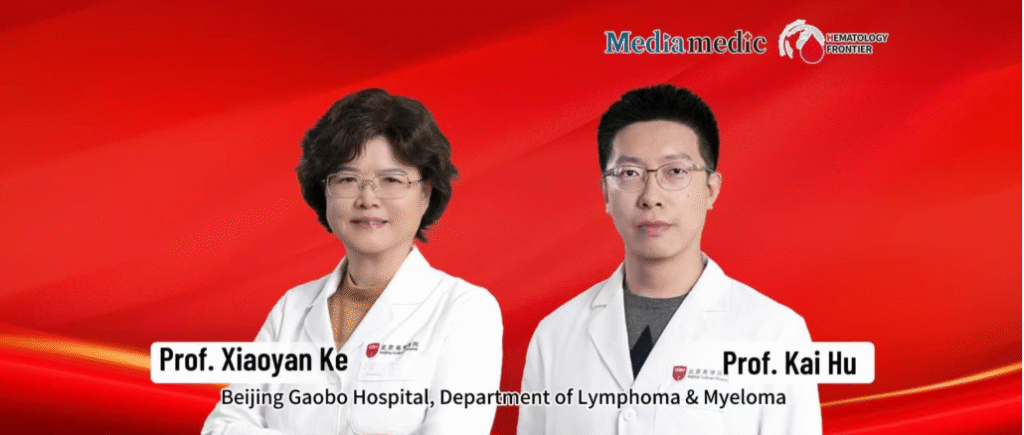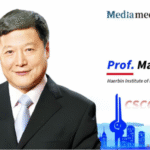
Relapsed/refractory diffuse large B-cell lymphoma (r/r DLBCL) is a highly aggressive hematologic malignancy. In recent years, CD19-directed chimeric antigen receptor T-cell (CAR-T) therapy has brought a revolutionary breakthrough for r/r DLBCL patients. However, not all patients achieve a durable complete remission (CR). Previous studies have shown that patients who achieve only partial remission (PR) after CD19 CAR-T therapy have a significantly higher early relapse rate, and once the disease progresses, median overall survival (OS) can be less than six months. This creates an urgent need for treatment strategies that can deepen response and extend survival in this high-risk population. CD20 is widely expressed on the surface of B cells and represents an attractive therapeutic target for CAR-T therapy. CD20 CAR-T therapy has already demonstrated encouraging efficacy in patients with r/r B-cell non-Hodgkin lymphoma who relapsed after CD19 CAR-T therapy. Recently, the team led by Professors Ke Xiaoyan and Hu Kai from Beijing Gaobo Hospital published a paper in Transplant and Cellular Therapy titled “CD20 CAR-T Therapy Preemptively Treats Patients with Relapsed/Refractory DLBCL in Partial Remission after CD19 CAR-T.” The study focused on the clinical efficacy and safety of CD20 CAR-T as a preemptive consolidation therapy for r/r DLBCL patients who achieved PR after CD19 CAR-T.
Study Results
The study enrolled 19 adult r/r DLBCL patients treated between 2019 and 2022 who had achieved only PR following CD19 CAR-T therapy and subsequently received CD20 CAR-T infusion. Remarkably, 16 patients (84.2%) achieved CR — a rate substantially higher than previously reported for CD20 CAR-T used as salvage therapy.
With a median follow-up of 29.4 months, median progression-free survival (PFS) reached 27.0 months (95% CI, 14.6–NR), indicating that most patients remained free of disease progression for a prolonged period. Specifically, 12- and 24-month PFS rates were 78.9% and 57.0%, respectively, highlighting the durable benefit of CD20 CAR-T as consolidation therapy. Median OS had not yet been reached, with 12- and 24-month OS rates of 94.7% and 78.6%, suggesting a favorable long-term survival outlook.
In terms of safety, CD20 CAR-T was well tolerated. No grade ≥3 cytokine release syndrome (CRS) or immune effector cell-associated neurotoxicity syndrome (ICANS) events were observed, underscoring its favorable safety profile. Although some patients experienced grade ≥3 hematologic toxicities such as neutropenia (79%), leukopenia (78.9%), and thrombocytopenia (47.2%), these events generally resolved within one month and did not significantly impact overall outcomes.
Moreover, CD20 CAR-T cells demonstrated robust in vivo expansion, with a median peak time of 11 days and a median persistence of 28 days. In a subgroup analysis of patients with TP53 mutations, 6 of 7 (85.7%) achieved CR, and both median PFS and OS were not reached, suggesting excellent efficacy even in this traditionally poor-prognosis group. Among patients without TP53 mutations, 6 (75.0%) achieved CR, with a median PFS of 21.3 months, further supporting the broad applicability of this approach.
Summary and Future Perspectives
Professor Hu Kai: “This study is the first to systematically evaluate CD20 CAR-T as a preemptive consolidation strategy for r/r DLBCL patients in PR after CD19 CAR-T. This innovative approach fills a major gap in clinical practice, offering a much-needed treatment option for this high-risk population.The efficacy results are remarkable. With a CR rate of 84% and a median PFS of 27 months, these outcomes surpass those previously reported for CD20 CAR-T used solely as salvage therapy.Several factors may underlie this success. First, addressing antigen heterogeneity is crucial: after CD19 CAR-T, some tumor clones escape immune pressure by downregulating CD19 expression. Sequential use of CD20-targeted CAR-T can eradicate these escape clones, prolong CAR-T persistence, and deepen remission. Second, early intervention plays a key role — administering CD20 CAR-T preemptively before overt relapse allows more thorough clearance of minimal residual disease (MRD) and secures longer disease-free survival.
Additionally, lower tumor burden and improved immune microenvironment after partial response may provide more favorable conditions for CD20 CAR-T expansion and antitumor activity. Standardized management — including bridging therapy, lymphodepletion regimens, and strict infection prevention protocols — has also contributed to excellent patient outcomes.”
Professor Ke Xiaoyan: “The Lymphoma and Myeloma Department at Beijing Gaobo Hospital has accumulated extensive clinical experience with CAR-T therapy. Our standardized approach to bridging therapy, lymphodepletion, and infection prophylaxis has built a safe and efficient treatment framework, ultimately improving patient prognosis.”
Expert Profiles

Professor Hu Kai- Director, Department of Lymphoma and Myeloma, Beijing Gaobo Hospital- Over 20 years of clinical and research experience in hematology- Specializes in standardized diagnosis and treatment of hematologic malignancies including leukemia, lymphoma, and multiple myeloma- Expertise in CAR-T therapy, CIK/NK cell immunotherapy, targeted therapy combined with chemotherapy, and autologous/allogeneic HSCT- Extensive experience in managing complex transplant-related complications- Education: MD (Peking University, Clinical Hematology), MSc (Sichuan University), MBBS (West China University of Medical Sciences)- Has led or participated in over 100 clinical studies (PI in >40), treated ~1,000 CAR-T cases, and presented 57 abstracts at major international meetings (EHA, ASH, EBMT, APBMT)- Published 40+ peer-reviewed papers and contributed to 5 professional books

Professor Ke Xiaoyan- Chief Consultant, Department of Lymphoma and Myeloma, Beijing Gaobo Hospital- Head of Adult Lymphoma Program, Gaobo Medical (Hematology) Beijing Research Center- Professor (Tier II), Doctoral Supervisor- Former Chair, Hematology Committee, Chinese Women Physicians Association- Chair, Targeted Therapy Committee, Chinese Women Physicians Association- Executive Vice-Chair, Oncology Expert Committee, Chinese Women Physicians Association- Vice-Chair, Hematologic Oncology Committee, Chinese Geriatrics Society- Vice-Chair, Hematology Committee, Chinese Medical Education Association- Standing Committee Member, Lymphoma Committee, Chinese Anti-Cancer Association- Deputy Editor, Journal of Leukemia & Lymphoma; editorial board member of multiple journals- National and municipal expert in medical technology evaluation and consultation; Central Health Care consultation expert


